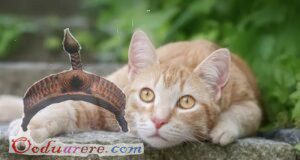Igba didi is a special ritual in Egbe, which is used to cure anti-social behavior, People with the experience of having sex in the dreams and in reality Semen appear all over their body are said to be the victims of “Oko-Orun” (Spirit husband). No matter how beautiful a lady may be, if she is a victim of Oko Orun, she would definitely have a problem in getting married as she is stigmatized by the husband in heaven thus making potential suitors lose interest in her without any plausible reason (Salami 2014). In this kind of situation IGBA DIDI should be done for this victim in order to tear the Oko-orun and the victim apart. Other problems for which Igba didi can be used are what Salami (2014) pointed out.
A) Runaway Kids: Some children run away from home without any apparent reason. Such children journey from city to city. Expectedly, they are often in rags and sleep anywhere. When they are found and brought back home, they take off again. Adetayanyan, one of Egbe is usually responsible for this. this is cured with the ritual of Igba didi.
B) Kleptomania: Compulsive stealing has been traced to Eleeko. At times, runaway kids are also kleptomaniacs.
C) Bed-wetting: After the age of three in most cases, kids are expected to stop bed-wetting. But there some adult who bed-wet. Igba didi can also correct this abnormality.
D) Compulsive lying or stubbornness: Compulsive liars are also related to Eleeko.
THE IGBA DIDI PROCESS
According to some priests, the subject is first calm in the center of a room, surrounded with priestesses. They will then be reciting Egbe chants, invoking sprits to partake in the entire ritual.
Procuring the ritual materials from the market can be harzardous, especially when it involves the liberation of a spouse from his or her spritual mate. Monies will be mysteriously lost, materials which cannot be subsituted will be missed out, and at times, the buyer forgets his way home and wanders aimlessly. Fatal accidents could be reported, all because of the fierce opposition of spirit entities. All the incidents are targeted at thwarting the efforts to free the victim.
Once all the materials are ready and arranged, the calabash is wrapped in red or perhaps white. The subject’s wrapper or trouser is removed, rolled up and placed on thr head of the client. The calabash is then placed on top of it. The client is also dressed in crimson linen and in a file, the gathering will head for the chosen river. Priest of Egbe will follow, chanting hyms of Egbe. Just before the bank of the river, the priests must stop and ask the client to put the calabash on the flowing river,
At times, mild dramas attend the mere puttting down the calabash with the subject wailing that the spirit mates have refused to allow him or her to put down the calabash. The priests then have to intensify their praise and pleading with Egbe realm.
Ultimately, when the subject is allowed to drop the calabsash, it will be palced where it will be gently carried away by the river. The choice of the rivers to place the sacrifice may be born out of the belief that a flowing river carrying away the calabash is tantamount to washing away troubles that have plagued the client.
Days after the ritual, the subject is given water from the Aawe (sacred pot of Egbe) to drink and bathe till full recovery from the web of spiritual troubles. The removal of the bond is the first step of recovery; there is need fir continuous monitoring, especially in the cases of Kleptomaniacs and runaway kids to finally bring them up to acceptable standards of social conduct.
There is another ritual done in conjunction with Ifa divination. This is when the Egbe has put an evil mark on a person. In such situations, the client is asked to tie stands of fresh palm leaves on the forehead and dress in crimson cloths. Ifa will reveal what any angry spirit mates demand and where it will be placed. After the requisite Ifa verses have been recited on the offering, the subject proceeds to the location with the items carried with both hands, The ritual is usually performed at night.
CREDIT: AYO SALAMI, 2014, EGBE, HEAVENLY MATES OF EVERY HUMAN
 Ọmọ Oòduà Naija Gist | News From Nigeria | Entertainment gist Nigeria|Networking|News.. Visit for Nigeria breaking news , Nigerian Movies , Naija music , Jobs In Nigeria , Naija News , Nollywood, Gist and more
Ọmọ Oòduà Naija Gist | News From Nigeria | Entertainment gist Nigeria|Networking|News.. Visit for Nigeria breaking news , Nigerian Movies , Naija music , Jobs In Nigeria , Naija News , Nollywood, Gist and more









